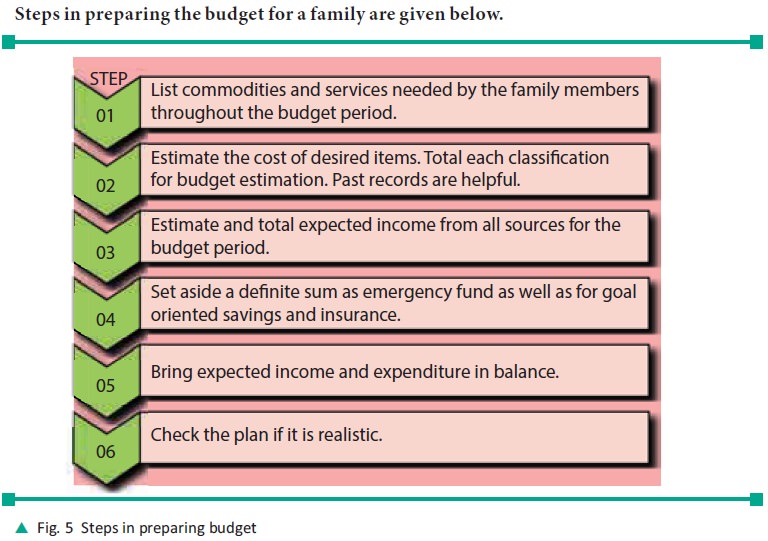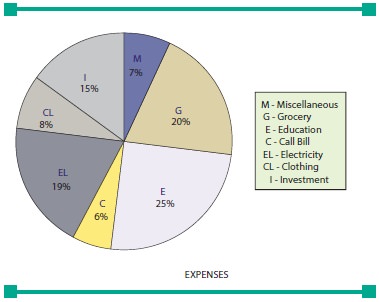Family Resource Management - Expenditure and Budget Management | 11th Home Science : Chapter 7 : Family Resource Management
Chapter: 11th Home Science : Chapter 7 : Family Resource Management
Expenditure and Budget Management
EXPENDITURE AND BUDGET MANAGEMENT
Happiness of the family is secured by income
use or expenditure. The outflow of money is called expenditure. After earning
money, a family spends it on their various needs, basic necessities such as
food, clothing and shel-ter. After their needs are fulfilled, the family
desires to have comforts and luxuries, which makes the family members more
comfort-able. All these expenses are referred to as expenditure. Expenditure
provides the satis-faction of life for the members of the family.
Factors Affecting Expenditure of a Family
Income: In low-income groups, a major portion of income is
spent on food whereas in high income groups only %50 of their money is spent on
food.
Family size: Expenses on food, clothing, and education is more in larger families as compared to small
sized families.
Family composition: In the expanding stage of the family
more money is spent on education and clothes while in the contracting stage,
more expenses are incurred on medicines.
Family status: Influenced by the social circles they move in, a considerable amount of cash may be spent
by some families on, maintaining a number of cars, designer clothes,
entertainment, luxury items.
Type of family: In a joint family, money is saved on rent and childcare.
Family values: Some people give more value to education and prefer spending more on books. Those
giving more importance to religion spend more on religious activities.
Location: There is less expense in small towns as compared to
that in cities. If the school or office is nearby, less money is spent on
transport.
Skill, knowledge and an interest to save: A homemaker with her
knowledge, skill and interest in culinary arts can prepare exotic dishes at
home and thus reduce her expenditure.
Access to community
facilities:
Community facilities help save expenses. A
person using a library need not spend money on buying books.
Budgeting
The common planning device for the use of
money is the budget. It is a care-fully prepared spending plan based on the
actual family income. It is a plan based on previous experience, present needs
and future expectations. A budget is always prepared for a fixed period of time
gen-erally for a month. Budget is a guide to realistic spending aimed at
avoiding over expenditure.
Importance of budgeting
·
Budget acts as an intelligent guide to spending.
·
It enables a family to have an overall view of their income.
·
Budgeting facilitates adjusting irregu-lar income to regular
expenditure.
·
Budgeting helps people to discuss their needs and set their own
priorities on them.
·
It helps one to cut unnecessary expenditure.
·
It helps one to be free from debts.
·
It helps one to live within one’s income.
·
It encourages conscious decision mak-ing which may help in
including long term goals in the budget.
·
It relieves the family members from worries of future.
·
It forces one to decide what one wants most out of life.
·
It provides for future saving.
Its success depends upon its being simple,
realistic, flexible and suited to the family or individual for whom it is made.
The List of Budget Items
It is necessary to list the chief budget items to make sure that each item is attended to in the expenditure plan while portioning the income. Each family may have their own way of listing the items.

The chief budget items include:
i.
Food
ii.
Clothing
iii. Housing
iv.
Education
v.
Transport
vi.
Personal Expenses (Sundries)
vii.
Household Expenses
viii.
Savings

Related Topics